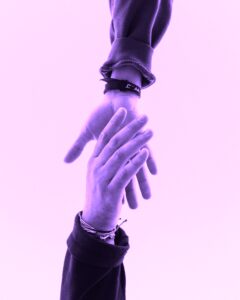 During Covid, one of things I missed most was fleeting encounters with strangers.
During Covid, one of things I missed most was fleeting encounters with strangers.
The cashier at the grocery store, the seatmate on a plane, the person behind me in a slow-moving line. More often than not, I am a person who talks with strangers. Often I prefer them to talking with people I know. With strangers, I can gauge and widen my understanding of how people operate, what they look like, how they smell, what their eyes hold. I like strangers for the possibility of unexpected delight.
During the Pod Times of Covid, I had friends I could talk with and more Zoom than I wanted, but there was so little surprise outside of the immensity of my sorrow. Gone were those fleeting encounters, sometimes revelatory in their intimacy. I yearned for the temporary orbit of a stranger, the tennis of small talk during a friction-free transaction creating that soft connecting point I rely on to tether me to the stream of humanity outside of my familiar circle. I know the people I know; I want a glimpse into more of those I don’t.
For the recent fall break at my university, I returned to Bratislava, Slovakia, a city I lived in for four years in the early 2000s. I booked an Airbnb and arrived in the city a few hours before check-in time. I texted the owner asking if I could leave my suitcase and return to the rental later. He agreed and told me to meet him outside the building in 30 minutes.
When his car pulled up, I was sitting on a bench beneath a tree thick with golden autumn leaves. He approached me with a smile and an outstretched hand. Our hello was unremarkable.
He looked to be in his mid-30s with sandy hair and a closely trimmed beard. He wore the global urban uniform of jeans, boots and a sweatshirt. Matus. His name was Matus.
We small talked, benign and pleasant. My intuition hummed and the superhighway of my vagus nerve jammed with billions of databits. What is the exact calculus we all undergo when we meet a stranger? How many data points in how many nanoseconds do we furiously process to reach our calculation and release into comfort? Or harden into suspicion? Or flinch in apprehension?
I knew in a way that lay below the waterline of my conscious reasoning, that Matus was safe. But it was more than an absence of fear I had perceived. Safety is not my prevailing metric.
Instead it felt as if I were in the presence of something beatific, something alchemic that reverberated beyond the everyday trappings of our encounter. It felt to me as if Matus exuded a faint radiance. It was not his looks or a megawatt smile or any semblance of sexual attraction. It transcended this. It was deeper than this.
These thoughts evaporated as he collected my suitcase and offered me a ride. I told him that I preferred to walk nostalgically through the city toward the café where I headed to meet a friend. I told him I wanted to see the way the city had changed.
As we shook hands goodbye, our eyes took each other in, and we said goodbye. As Matus drove away I registered the quiet and astounding sensation of being seen.
When I settled into the café 30 minutes later, there was a text from Matus. It read: “I know it was only about 5 minutes that we met and spoke, but I feel like you are a kind person with a large heart.”
A second text below it: “I am by nature a quiet and cautious person. For my work I meet 20-30 people a week. But there was something between us that made me want to trust you.”
I replied and told him I had felt the same. I thanked him and spent the rest of the day feeling, as the poet Anna Akhmatova says, “the secret of secrets was inside me again.”
I tend to believe the universe is a marvel, a benevolent place. I’ve had the privilege to amass evidence to support my belief, to confirm this bias. But in these post-Covid years I’ve seen myself slower to thaw than I would have imagined.
And then I encountered Matus.

